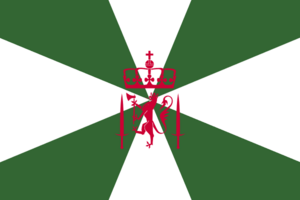United Kingdom of Fluval
This article is incomplete because it is pending further input from participants, or it is a work-in-progress by one author. Please comment on this article's talk page to share your input, comments and questions. Note: To contribute to this article, you may need to seek help from the author(s) of this page. |
The United Kingdom of Fluval Name in national languages
| |||||||
|---|---|---|---|---|---|---|---|
|
Flag | |||||||
| Motto: "We work, not for our pockets, but for the promises beyond" | |||||||
| Anthem: "Our Promised Land," composed by the late Harald Sterling Royal anthem: "May God enrichen us all" | |||||||
| Capital | Valia | ||||||
| Official languages | Norddia, Angloterre | ||||||
| Recognised national languages | Angloterre | ||||||
| Recognised regional languages | Skaeltala | ||||||
| Minor languages | Gallix, Deutschspaake | ||||||
| Ethnic groups (2024) |
| ||||||
| Religion | Secular state | ||||||
| Demonym(s) | Fleuvan, Fluvean Flevvalander (historical) | ||||||
| Government | Feudal unicameral parliamentary constitutional monarchy | ||||||
• Storstelord Flevvaland | Reyne Kallemsen | ||||||
| Legislature | Storrlords | ||||||
| Establishment | |||||||
• Rettie-en-Vali (Treaty of Valia) | 1456 | ||||||
• Laws in Skaelterre Act | 1568 | ||||||
• Flight of the Smalrlords | 1645 | ||||||
• Storrlord Incorporation Act | 1770 | ||||||
• Anglais Revolution | 1862 | ||||||
• Brothers' War of Salvation | 1863 | ||||||
• Skaeling Insurgency | 1908 | ||||||
• Emergency Powers Act | 1912 | ||||||
• Storrlord Ascendancy | 1964 | ||||||
| Population | |||||||
• 2024 census | 18,980,000 | ||||||
| GDP (nominal) | 2024 estimate | ||||||
• Total | 2,975,893,180,000 FSH | ||||||
• Per capita | 156,791 FSH | ||||||
| Gini | 78.89 very high | ||||||
| HDI (2024) | 0.7282 high | ||||||
| Currency | Fleuval shillier (⨎) (FSH) | ||||||
| Date format | Fleuvan Standard calendar: yyyy-mm-dd (AC) | ||||||
| Driving side | right | ||||||
| Calling code | +128 | ||||||
| ISO 3166 code | FL | ||||||
| Internet TLD | .fl | ||||||
Fluval, formally known as the United Kingdom of Fluval, is a sovereign state in TO DO etc etc. Fluval is a decentralized, feudal parliamentary monarchy composed of the wealthiest lords of the land, as stipulated in royal corporatocratic doctrine. The nation is home to a surprising number of cultures and languages, with the nation's current serenity betraying the disputed history of various kingdoms and native tribes that have inhabited the region within the past 4,000 years.
The region now known as Fluval was first recorded to have been settled by various Skaeling peoples, as a small part of a wider archaelogically attested culture. Their craftsmanship in the production of bronze weaponry and elaborate pottery would be unmatched in the region for no less than two millennia, however a suspected combination of disease, natural climate change, and population pressures had caused the disintegration of this culture by the time of the first attested written records of the region and its peoples. Within two centuries of these first records, the further steady decline of local polities had opened the door for their subjugation under the Thalassolic Imperium by 350 BCE. Fluval had come to prosper once more under Thalass rule and became one of the empire's major breadbaskets owing to the very fertile Fluva river delta, in turn its people largely became Thalassicised culturally, resulting in the proto-Anglais - especially during the later twilight and departure of their rule from the land in 632 AD. The weight of the empire's bureaucracy had simply given out under itself with the limited technological abilities of the period, and as such, the ideals of statehood and bureaucracy had been replaced with endless strife as competing petty kingdoms and warlords vied for control over the formerly prosperous region.
Over the centuries, the Fleuvian region had once again become a vast battleground for local power struggles, but this time it was not exempt to the ambitions of those from foreign shores. The presence of the ancestors of the modern Norddia population in the region were first recorded as foreign mercenaries, "pagan, brutish Nordlands" according to the writings of Saint Sesair, fighting on the behalf of many factions in the region and usually being paid in fertile land of their own to plow and live on. In the midst of what contemporary literature has dubbed the (Second) Intermediate Period, there were signs of the changing winds coming ashore as local rulers depleted the local population even further through incompetence and constant strife, more and more Nordlands were recruited to form the bulk of the men-at-arms. Widespread emnity and cultural divides soon shone through amongst the strife resulting in mutual massacres and wars of conquest, culminating in the Great Nordlander War and the eventual creation of the Nordlaw across much of the territory.
